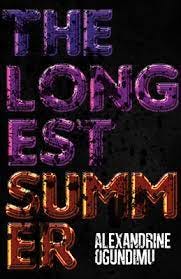Spilling Solo Cups: A Review of Alexandrine Ogundimu’s “The Longest Summer”

As humans tend to run on high emotions, it’s fascinating to look at what can most easily drain them. There’s physical draining that results in hunger, sickness, and sleepiness, but then there’s emotional drains that can numb emotions with addictive substances or external factors that create stress and anxiety. When a person is continually drained and put into stressful situations, it can result in a complete shutdown or explosion of emotional distress.
In her debut novel The Longest Summer, Alexandrine Ogundimu examines a young man experiencing the worst summer of his life. Victor is biracial, bisexual, and trapped in his small town in Indiana. He hopes to escape by attending grad school in New York, but the conditions for such an escape set by his abusive father are threatened when cash continues to disappear from his retail job. Victor’s dark period is also affected by various people in his sphere, including his drug dealing friend and two love interests, one of whom may be the one behind the workplace thefts.
Ogundimu’s prose details exactly how draining and unpleasant Victor’s situation is. Many of the chapters in the novel go to lengths to explain the locations and culture of Abboton, Indiana, while others are brief paragraphs detailing anecdotes and thoughts of its characters. Because of this, the reader is easily drawn into the setting, and the result is one full of ennui.
This is mainly aided by the complex and multilayered characterization of Victor, who is in truly the worst environment for someone of his racial, sexual, and class identity. In nearly every space he inhabits, Victor is rarely able to fit in due to some disqualifying characteristic. He’s either not white enough, not straight enough, too privileged or not privileged enough, and it makes it easy to understand why he may turn to drugs or hanging out with a rough crowd in some hope for satisfaction or acceptance.
What makes it tragic is that there is plenty to like about Victor and plenty of details about him that show his interests or habits, such as his computer collection of yaoi artwork on his computer or the repeated instances of him making specific drinks in Solo cups. The issue comes from the fact that so much is ascribed onto him by others who wish for him to identify or be some kind of person without real care for what he wants. This is most present in Victor’s father, a homophobic Nigerian immigrant who dominates his home with financial abuse, acts of physical and emotional violence, and the Narcissist’s Prayer whenever challenged.
However, while the novel covers a very grim time in this person’s life, it isn’t afraid to allow for some moments of joy. There are moments with Victor’s love interests Kyle and Amory that provide some levity and some hope. His relationship with Kyle may be complicated and hindered by personal issues, but Kyle also represents a freedom and openness that Victor longs for to some degree where he can celebrate his queer side without fear of disownment. Amory, meanwhile, expects nothing from Victor but his company, and his moments with her allow for some unguarded moments and small pleasures that the novel suggests results will be one of his most stable relationships.
The Longest Summer perfectly captures the black comedy that is midwestern life through its complex central character and colorful writing. Ogundimu’s debut is a Solo cup cocktail with plenty of sour and bubbly elements to give the reader a buzz as they continue to indulge. It looks to capture one life-changing season in a young person’s life for all the gritty unpleasantness that comes from trying to place yourself in the adult world.
Spilling Solo Cups: A Review of Alexandrine Ogundim was originally published in ANMLY on Medium, where people are continuing the conversation by highlighting and responding to this story.
